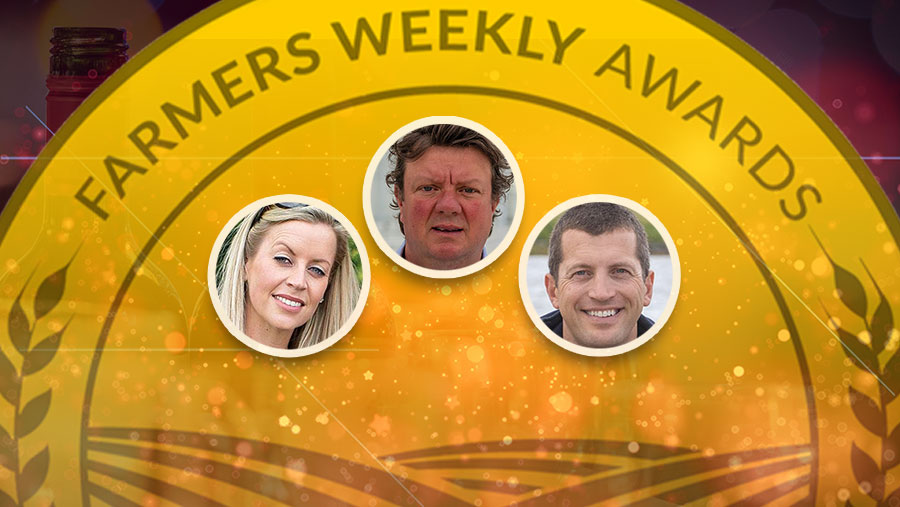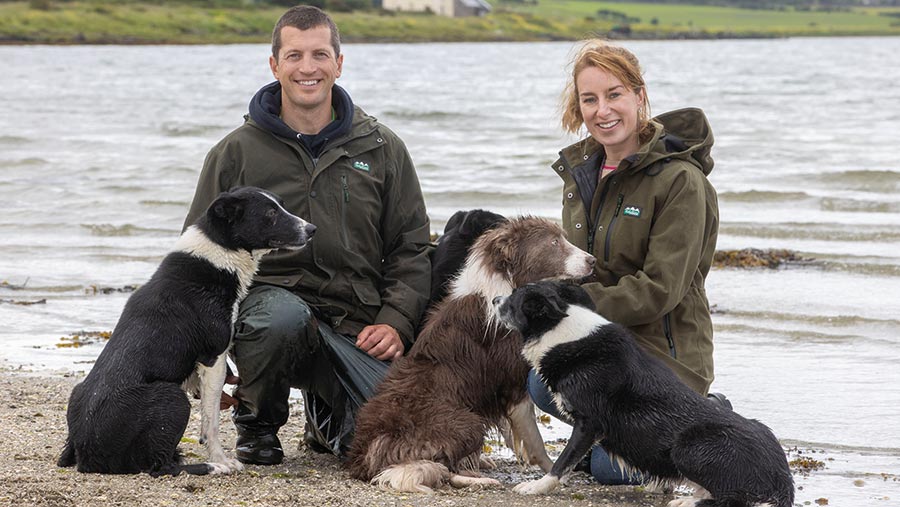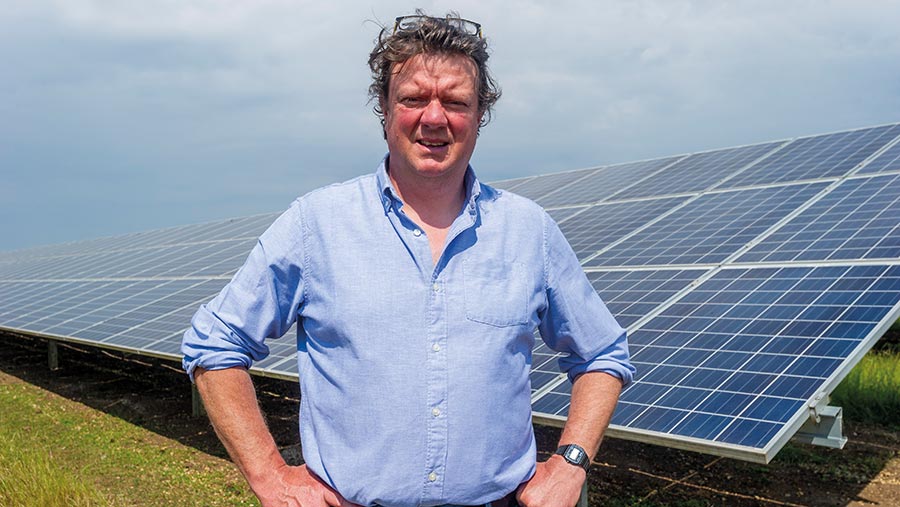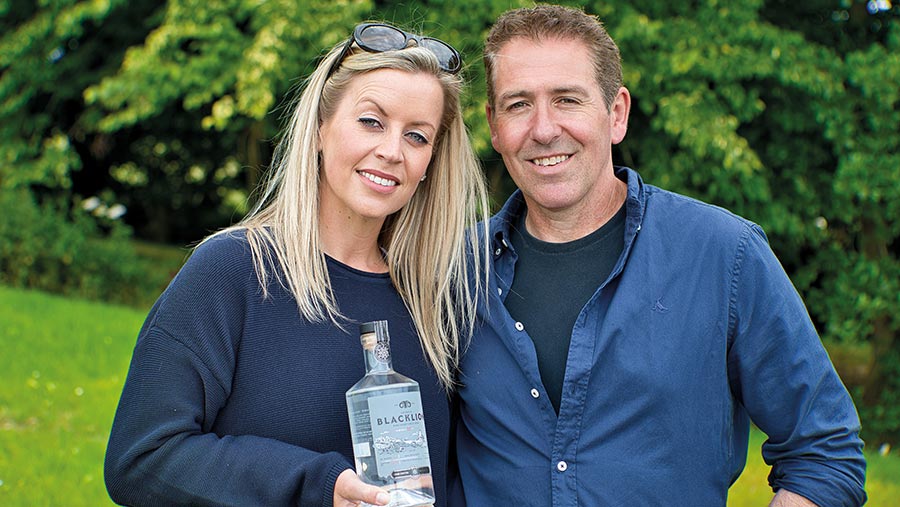FW Awards 2022: Diversification Farmer of Year finalists

This year’s diversification category was characterised by innovative businesses at the heart of the farming community.
All finalists have championed creativity and shown great environmental consciousness through sustainable practices.
See also: How a dairy farm is using a straw dryer to reduce waste
The finalists:
Emma Gray and Ewan Irvine
Sheepdog School, Isle of Bute, Scotland
Kier Petherick
Stowbridge Farm, Ely, Cambridgeshire
Tim and Tanya Spittle
Black Lion Vodka, Moreton-in-Marsh, Gloucestershire
The judges:
Alison & Fergus Younger
Last year’s winners
Matilda Bovingdon
Farmers Weekly machinery reporter
Oliver McEntyre
Independent judge and National strategy director, Barclays Agriculture
Emma Gray and Ewan Irvine
Sheepdog School, Rothesay, Isle of Bute

Ewan Ervine and Emma Gray © Jeff Holmes
Husband and wife team Emma Gray and Ewan Irvine have turned two decades of shepherding knowledge and expertise into a budding online subscription business.
Leaving the remote Northumberland National Trust farm Fallowlees behind, they relocated to Bute last year, taking on a new tenancy and 283ha of ground on which they run a mixed 650-head flock producing salt marsh lamb.
Emma first became known for her trialling success representing England, and for appearing on the BBC’s This Farming Life. As the show was broadcast, questions came flooding in from farmers near and far, asking for advice, tips, help and training tutorials for their wayward sheepdogs.
Sheepdog School
Along with rearing cattle and sheep on the island’s pastures and salt marshes, the pair wanted to provide answers to these recurring questions.
To help guide farmers with training their dogs, Emma and Ewan set up the Sheepdog School – an online, subscription-based platform that has established them as the de facto border collie experts of the Scottish isle.
Hosted on Patreon, Sheepdog School has amassed a following of more than 700 subscribers, each paying a monthly fee to access Emma and Ewan’s content.
The platform allows them to pass on their years of accumulated knowledge and experience, which spans a vast range of topics, from a dog’s early training and first introduction to sheep, all the way through to teaching commands and direction training.
They don’t just provide help for young dogs, however, but also show subscribers how to correct behaviours with more mature working dogs, whether they want to hone their technique or prepare for local and national trials.
Subscribers usually have a herding breed of dog, but come from a range of different backgrounds.
“Not all of our subscribers are farmers,” says Emma, “There’s a real mix, and increasingly we’re seeing people that have bought a collie as a pet and are wanting to explore their dog’s natural instincts. Before you know it, they’re actually buying sheep for the dog, or small pieces of land.”
They film all of the video content themselves, a process that is time consuming in the midst of their day-to-day farming duties.
They invested in their own camera and other equipment, and Ewan takes the lead on most of the filming, having learned his way round the editing software.
A global business
Emma and Ewan also breed from their top sheepdogs, and train the pups to sell as working or trialling dogs.
Their talent for training has seen demand come from all corners of the globe. So far, customers have flocked from as far afield as Israel and Australia, as well as Europe and parts of the US.
Community, trialling and the future
The couple’s passion for sheepdogs and trialling has proved infectious, bringing together a small community of like-minded farmers on the island.
The pair have been fundamental in setting up the Trials of Bute, which Emma chairs. The four-day event takes place on several different farms on the island and attracts competitors from all over the UK.
Having already achieved so much in their short time on the new farm, the future, according to Emma and Ewan, will be full of training the very best sheepdogs for trialling and sales, and continuing to produce their salt marsh beef and lamb. They are also in the process of turning the land into the first organic farm on Bute.
What the judges say
Emma and Ewan have a great story of making their way in farming, and adding value to the business through the Sheepdog School – it is innovative, crosses international borders and is accessible for all through the power of the internet and social media”
Emma Gray and Ewan Irvine summary
The judges liked
- Core relationship with farming is at the heart of all they do, and the subscription service and social media channels allow viewers to come along on the journey
- Brilliant way to share years of knowledge and make it profitable
- Community involvement with the organisation of trialling competitions on the island
Farm facts
- Tenancy taken on in 2021
- Producing salt marsh beef and lamb on a range of pastures
- Soon to gain organic status, which will make it the first organic farm on the Isle of Bute
The numbers
- 50,000 social media followers
- 12 working sheep dogs
- 283ha of land
- 650 ewes
- 30 cows
Kier Petherick
Stowbridge Farm, Ely, Cambridgeshire

Kier Petherick © Jason Bye
Farmer and serial entrepreneur Kier Petherick is no stranger to bold farm diversification projects.
Running a family farming partnership near Ely, Cambridgeshire, he and his family grow wheat, barley, oats and potatoes.
But it is his work with renewables that is the stand-out feature of the 1,600ha farm.
Kier says that he has a passion for three things: farming, engineering and renewable energy sources.
He first dabbled with the latter in 2013, with the construction of a 32ha solar site, which does double duty as grazing land for a neighbouring flock of sheep.
Since then, his various diversifications have grown considerably in both size and ambition and, among several other projects, he has developed a 22ha greenhouse producing 25t of tomatoes a day and 1.2m cucumbers a week, all of which are supplied to supermarkets across the country.
Renewable energy
A reservoir built on the farm in 2010 has served as a foundation for several of the farm’s diversification projects, including a joint venture that Kier oversees: Hannam’s Wake Hub and the Cambridge Aqua Park – two attractions that bring paying visitors from near and far to the site.
Watersports enthusiasts can a waterski and wakeboard using a cable mounted on the banks of the reservoir, and there are two training areas for beginners.
A giant inflatable assault course, which also operates on the reservoir, can accommodate up to 80 people an hour.
A second reservoir was added a few years later, and together the two bodies of water now assist with the provision of heating for the gargantuan greenhouse.
Kier began the greenhouse project last year, and its construction is undoubtedly his greatest renewables engineering feat to date.
Heat is pumped from the nearby reservoirs via a combined heat and power (CHP) plant, which produces heat and carbon dioxide as by-products.
Rather than waste these emissions, they are diverted to provide dual benefits to the crops in a clever circular system.
The waste heat adds further warmth to the greenhouse, and the carbon dioxide is redirected to be absorbed by the plants, creating a sustainable system.
Working within the vast greenhouse is a budding community of 180 staff members.
Thanks to the innovative and cost-effective heating system, crops can be grown year-round, and thus staff are employed full-time too, allowing for greater job security in an industry that is usually defined by the availability of seasonal workers.
Challenges
It hasn’t all been plain sailing, however. Building a greenhouse of such giant proportions during a global pandemic brought challenges by way of key material shortages, such as the vast quantities of glass required for the construction.
Similarly, the second Covid-19 lockdown brought with it a host of restrictions limiting the number of staff allowed to work on the site.
Despite this, the phenomenal build was completed in record time. “From pushing the first soil on site with a bulldozer, to having the first crop ready to sell took just 54 weeks,” says Kier.
When asked about the future, Kier, who is keen to be at the forefront of innovation, says he has recently taken an interest in green hydrogen production, and that more renewable and solar projects are definitely in the pipeline.
After the success of the greenhouse build, there may well be a second one in development in the near future.
What the judges say
Kier has really expanded the core farming enterprise with the wakeboarding lake and glasshouses on site. He is at the forefront of innovation, and we look forward to seeing what he will do next”
Kier Petherick summary
The judges liked
- A showcase of impressive engineering and innovation
- Great community sense, helping others to build a viable business
- Infectious entrepreneurial spirit
- Forward-thinking, circular approach to food production
Farm facts
- Greenhouse produces 25t of tomatoes a day
- 1.2m cucumbers grown each week
- Three solar sites built on the farm, stretching more than 1.6km
- A flock of sheep graze and maintain the grassland around the solar panels
The numbers
- 1,618ha of land
- 101ha of solar
- Two reservoirs
- 22ha greenhouse
- 180 Staff employed in the greenhouse
Tim and Tanya Spittle
Black Lion Vodka, Moreton-in-Marsh, Gloucestershire

Tanya and Tim Spittle © Richard Stanton
Based in the north of the rolling Cotswold hills, Tim and Tanya Spittle run a special flock of sheep with a very unique purpose.
When their 121ha family farm came out of a long-term tenancy five years ago, the pair took on 80ha, and soon concluded that they needed to diversify to create a lasting business for the next generation.
This, however, would not be their first attempt, as Tim first began the farm’s diversification journey nearly 15 years ago with the launch of an urban-style gym, Freestyle 360, to cater to the many former city folk moving to the Cotswolds.
Their latest venture, however, has taken a rather different form, and the pair decided to create something that had never been done before – at least not in Europe.
The first of its kind
Pulling a positive out of a challenging situation when the pandemic forced the gym to close, Tim and Tanya used the extra time on their hands to lay the foundation work for what they describe as the UK’s rarest spirit – Blacklion Vodka – a smooth, sipping vodka made from distilled sheep’s milk and Cotswolds spring water.
The unique selling point of this vodka is in its origin; not only for it being made from the whey by-product of the cheesemaking process, but also for the unique Black Lion ewes that provide the milk.
Tim and Tanya have created this special breed by crossing the Swiss Valais Blacknose sheep with a local dairy breed. The pair found that, on their own, the Valais Blacknose could not produce the yields required for the milking process.
They have steadily built up their flock numbers, and now have about 600 of the curly-fleeced milking ewes.
Curds and whey
A passion for local and sustainable produce is a big driver for Tim and Tanya, who work closely with two other businesses that are integral to producing their vodka.
Local cheesemaker Stephen Fletcher, of Berkswell Cheese, milks the Black Lion ewes alongside his own flock and keeps the milk to turn into curds, which he then crafts into a sheep’s milk cheese.
The leftover product from the cheesemaking process is the sugar-rich whey, which is usually disposed of as it seldom has a use. Tim and Tanya buy back the whey, which is then fermented, forming the foundation of their vodka.
Another local farming enterprise completes the distilling process. “We work closely with the distillers to create the perfect flavour profile,” says Tim, who along with Tanya has painstakingly developed the tasting notes of the spirit so that it bears no resemblance to regular supermarket brands.
“We wanted to be as sustainable as possible by using a by-product to create something super-premium,” says Tanya, and the result is a “small-batch and eco-responsible British dairy product”.
Getting creative with the product, a local mixologist has created a series of cocktail recipes with a Blacklion Vodka twist – one favourite is the Dirty Sheepdog, which is a take on the classic espresso martini.
Challenges
Though the exact production methods remain a close secret, the pair say the clarification and filtration of the whey initially posed the greatest challenge.
But this did not hold them back for long, and after investing a lot of time and research, they managed to create the pure, clear spirit of today.
What the judges say
Tim and Tanya have taken a long look at the farming business and developed a high quality brand and very special product. This is a great achievement, spurred on by local collaborations and skill sets”
Tim and Tanya Spittle summary
The judges liked
- They make a fantastic team and their different skill sets really complement the business
- Brilliant marketing, and a high-quality, good-looking product
- Thoughtful and sustainable branding – customers can opt to buy the vodka without packaging
Farm facts
- The 121ha farm came out of a tenancy five years ago
- Tim and Tanya farm 80ha of this, while Tim’s brother farms the remaining land
- The farm-based gym has a large membership base and eight personal trainers. Tim and Tanya get involved and lead the weekend spin classes
The numbers
- 121ha farm
- 600 ewes
- Vodka is distilled three times
- Best served at -1C
- Freestyle 360 gym has more than 300 members
Sponsor’s message
Propel Finance is delighted to be sponsoring this year’s Diversification category, and congratulates all of the finalists on this great achievement.”
Julie Warren, marketing and partnerships director, Propel

